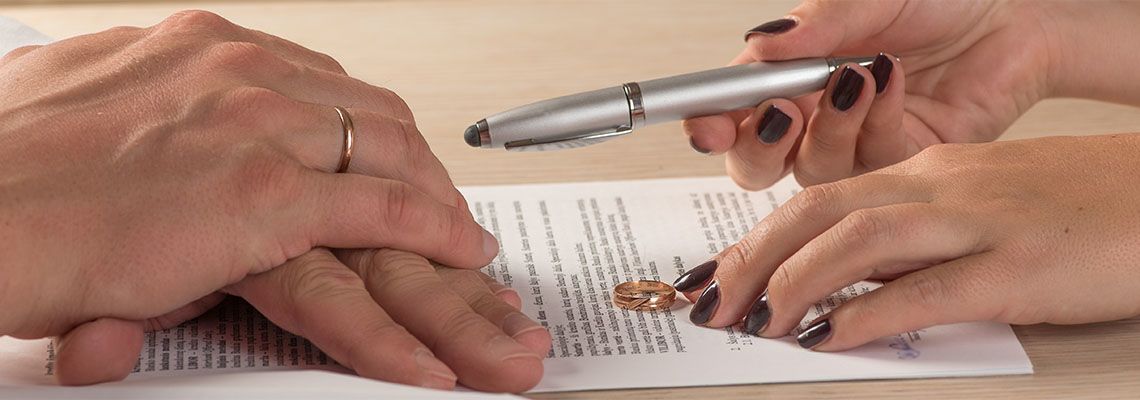My Spouse Filed for Divorce. Will I Have to Go to Court?

Going through the divorce process following a filing can be a difficult and stressful time. Knowing what to expect can help reduce anxiety and focus on the best course of action. If you’re in Edwardsville, Illinois, and neighboring areas — including Belleville, Carlinville, Jerseyville, Vandalia, Hillsboro, and Greenville — reach out to our firm so that you can help create the divorce process to be as stress-free as it can be.
Divorce Types
Finding the type of divorce that’s right for you may not always be blatantly obvious. Choosing between contested, uncontested, and collaborative divorce will determine how long the process will be; however, each type has its own benefits, as well. There are three main divorce types in Illinois:
Contested. A contested divorce occurs when one or both parties do not agree on the separation itself or the terms of the separation. As a result, the parties must go to court so a judge can decide on the final settlement (child support, alimony, custody, division of assets).
Uncontested. An uncontested divorce occurs when the non-filing party does not argue or fight against the separation even though they may not agree with the terms of the separation. This divorce type does not always go to court. However, the parties may need to do so if they cannot fully agree on all terms (usually to settle custody or child support issues).
Collaborative. Both parties agree on the separation and terms in this divorce type. The divorce settlement is filed in court merely as a legal proceeding though the parties do not need to step into a courtroom.
Mediation.. Mediation is a type of collaborative divorce, but it doesn’t need to be litigated or reviewed by an attorney. Mediation includes financial advisors and other officials as the two parties decide how to best separate assets and other aspects.
The Divorce Process
Here is what folks can expect from the divorce process in Illinois:
Deciding on a divorce type (contested, uncontested, or collaborative).
One or both parties must file in the county of residence for one or both parties. Though a 90-day residency period may be required before filing, there is no residency requirement.
One or both parties need to prove the grounds or reasons for divorce. Illinois recognizes grounds as “irreconcilable differences” or “irretrievable breakdowns.” The parties prove they have been separated for at least six months to prove their marriage’s breakdown.
The parties may reach an agreement on the separation terms to avoid going to court. The divorce process must go to court if the parties cannot agree.
The judge rules on the final divorce settlement, including alimony, child support, visitation rights, custody, division of assets, and allocation of responsibilities.
Please remember that reaching an agreement out of court is the best way to facilitate the divorce process. Therefore, hiring a trusted family law or divorce attorney is crucial to ensure a fair deal.
How Long Does the Divorce Process Take?
Overall, the divorce process can take from two months to over a year in Illinois. The length of the divorce process largely depends on the divorce type.
A contested divorce can take from six months to over a year.
An uncontested divorce can take from two months to over a year. Please note that a joint simplified divorce can take from a week to a month. However, this process is not available to everyone. The parties must meet the requirements before applying (i.e., being married for more than eight years, inability to procreate, total agreement on separation terms, the parties do not own property, the parties do not have joint accounts, and the parties must not make more than $60,000 annually).
A collaborative divorce can take from eight to fourteen months to complete. The speed of this divorce type depends on how cooperative the parties are.
Please note there is no waiting period to file for divorce in Illinois. However, the parties are expected to meet the filing county’s residency requirements of at least 90 days.
Knowing Your Options
Understanding your rights and knowing your options are crucial to making an informed decision. Thus, getting the right legal counsel can help you decide what is best for you. A trusted family law or divorce attorney can help you protect your rights so you can get a fair divorce settlement. Your options include collaborative divorce, contested divorce, uncontested divorce, or mediation. Our attorney is more than prepared to guide you once you’ve made the right decision for you.
Find the Right Divorce Attorney in Illinois
At the Hawkins Law Office, P.C., we serve the Edwardsville, Illinois, community and neighboring areas (including Belleville, Carlinville, Jerseyville, Vandalia, Hillsboro, and Greenville). We strive to protect our clients’ rights by helping them understand their options. Reach out today to protect your rights during this difficult time. Our family law and divorce attorneys are standing by to help you when you need it most. We are in your corner every step of the way.
